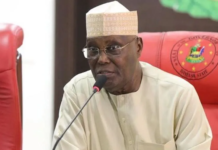Sekibo recently defended Wike, asserting that the narrative of Wike’s animosity toward the Ijaw people was false. He highlighted that Ijaws, though a minority in Rivers State, received five out of nine federal appointments under Wike’s administration.

Elder statesman Chief Edwin Clark has stepped into the fray, urging Senator George Sekibo to advise former Rivers State governor Nyesom Wike to let his successor, Siminalayi Fubara, find peace. The ongoing feud between Wike and Fubara has captured attention, revealing deeper political dynamics.
The heart of the matter lies in the Wike-Fubara conflict. Clark characterizes it as a sad and disturbing situation, where Wike embodies the godfather-godson syndrome. Fubara, handpicked by Wike, now finds himself at odds with his benefactor. Clark asserts that this isn’t merely an Ijaw versus other groups battle; it’s about what’s right and proper.
However, Clark’s response challenges this perspective. In a letter to Sekibo, he reminds us of the sacrifices made by the Ijaw community for Rivers State’s survival. Throughout Wike’s political career, the Ijaws supported him without demanding subservience. Clark emphasizes that Wike owes much of his success to their goodwill.
Clark’s advice to Sekibo and colleagues is clear: Wike should focus on his role as the FCT Minister. His national image has suffered, and it’s time to prioritize his responsibilities in Abuja. Clark’s poignant question resonates: Did the people of Ogu, Fubara’s hometown, lord their support over Wike when he became governor? The sacrifice of the Ijaw soul for political patronage warrants reflection.
Clark’s call for peace underscores the complexities of power dynamics, loyalty, and responsibility. As the feud continues, the Ijaw community watches, hoping for resolution and a return to harmony.




